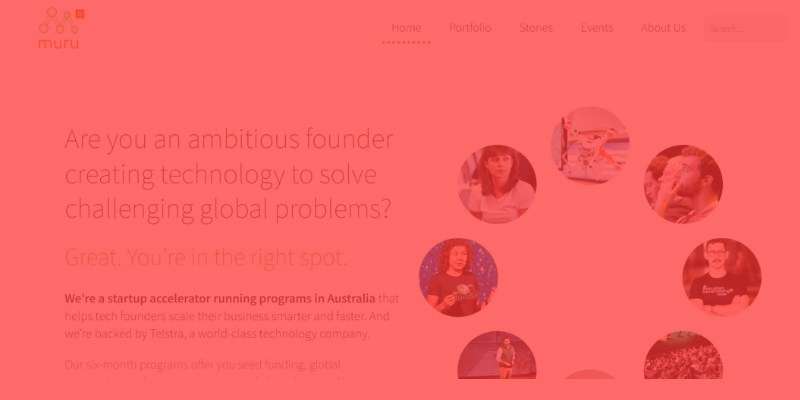Imagine carving out a niche for your bright business idea in a market teeming with potential. That’s the exhilarating journey Australian incubators are designed to facilitate.
For spirited entrepreneurs down under, these platforms are not just about office space; they embody the catalysts for innovation and success.
In this landscape, each incubator stands as a beacon, guiding startups through tumultuous early stages to the calmer waters of steady growth and development.
They offer a treasure trove of resources: from mentorship programs that EQUIP you with industry insights, to venture capital connections that inject lifeblood into your financial veins.
By journey’s end here, you’ll have unraveled how to leverage incubators for your startup’s advantage.
Whether you’re nestled by the Sydney Harbor or roaming the art-lined streets of Melbourne, this article uncovers the intricate web of support you stand to gain.
Explore the regions from QLD to SA, unlock funding avenues like the R&D Tax Incentive, and beckon angel investors to your cause.
Dive deep into understanding the start-up ecosystem that could elevate your enterprise from a dream to a tangible, thriving reality.
The 10 Best Australian Incubators and Accelerators for Startups
| Australian Incubators and Accelerators | Focus Area/Sector | Program Length | Equity Taken | Key Benefits/Features |
|---|---|---|---|---|
| BlueChilli | Technology Startups | Variable | Yes | Access to BlueChilli’s platform, capital, and network. |
| muru-D | Tech Startups | 6 months | Yes | Seed funding, co-working space, mentorship, and global network access. |
| Incubate | University of Sydney Startups | 14 weeks | No | $5,000 grant, mentorship, workshops, and networking opportunities. |
| Startmate | Various Sectors | 12 weeks | Yes | Investment, mentorship from successful founders, and a demo day. |
| The Melbourne Accelerator Program (MAP) | Various Sectors | 5 months | No | Funding, office space, mentoring, and pitching opportunities. |
| Springboard | Women-led Companies | 3 months | No | Tailored advisory, coaching, workshops, and access to a global network. |
| CyRise | Cybersecurity Startups | 6 months | Yes | Seed investment, mentorship, and connections to Asia-Pacific market. |
| The Good Incubator | Social Enterprises | Not Fixed | No | Support for impact-driven startups, mentoring, and community engagement. |
| Cicada Innovations | Deep Tech Startups | Not Fixed | Not Typically | Long-term tailored support, mentorship, and research connections. |
BlueChilli

BlueChilli offers both a startup incubator and a startup accelerator for tech startups. Early-stage founders rely on it to develop entrepreneurial skills and promote products. The program was launched by Sebastien Eckersley-Maslin in 2012, and it has been very successful. It covers a variety of topics and areas. Examples include financial services, business development, and venture capital.
BlueChilli helps startups identify their customers and their business partners. It invests in high-growth tech companies and new tech startups. With them, you get connections to venture capitalists, corporate partners, and experienced mentors.
BlueChilli’s startup incubator helps you target customers and strategic partners. It also has non-tech companies in scope, and it provides them with both the tech skills and the entrepreneurial skills they are missing. There are 3 different stages in the program, each focused on a different set of tasks:
- She Starts: The focus is female entrepreneurs with enduring technology companies. This is Australia’s only startup accelerator for women-led startups with a venture-backed program.
- Future Minds: This program focuses on education startups and non-technical entrepreneurs. If you are passionate about structured training and job markets, this is the place to begin. This program helps future minds develop a unique set of skills. Examples are problem-solving, critical thinking, data analysis, and more.
- HealthTech: Innovative startups in health tech should consider this part of the program. BlueChilli helps successful applicants develop skills to improve health outcomes in Southeast Asia.
muru-D

Muru-D was founded by Annie Parker, Mick Liubinskas, and Charlotte Yarkoni. The startup accelerator program is supporting startups for 6 months. It only selects 10 innovative startups for each period. The future mind accelerator looks into later-stage startups that solve global problems. Thus, they cover a wide range of industries and technologies, and any aspiring entrepreneur is welcome to apply. You can join the program at multiple locations in Australia, including Perth and Melbourne.
The main areas of focus are AgTech, Finance, Venture Capital, and Association. For each program, there is an intensive course with mentorship and alumni networks. Ambitious founders can get support from over 300 successful alumni and their investors. Overall, the accelerator program helped raise over $1 million in funds.
Incubate

INCUBATE is a startup accelerator developed by two Sydney University students. The founders are startup experts themselves. Thus, they look to support all ambitious future minds running successful businesses. If you have a sustainable business model and the potential to make a real business impact, this is the place to be.
The INCUBATE accelerator program takes 14 weeks. You get access to:
- Events, workshops, and membership by leading innovators.
- $5,000 in seed funding which is equity-free
- Expert support
What is specific about INCUBATE is that they also offer coworking space, as well as all resources that come along. Once you get equity-free seed funding, you will be ready to conquer the market with your solutions.
INCUBATE is also an award-winning incubator for startup founders who’ve just begun their journey. Your business models will be supported by student entrepreneurs who provide all the advice and resources you need. So far, the incubator program helped establish 135 successful companies.
Startmate

If we were to name the best-known incubator and accelerator in Australia, Startmate would easily take the lead. Niki Scevak established the program in 2010 and has been gaining momentum in Australia and New Zealand ever since. It offers a three-month program for a variety of sectors in the business world.
The programs take place two times per year, and they cover:
- Business development
- Personal Coaching
- Content sessions
- Coworking space
- A 1-week trip to San Francisco for all participants
Next to all these benefits, early stages businesses can raise capital through the program. The investment goes as high as $75,000 for a 7.5% equity.
So far, Startmate helped more than 175 founders in the startup world. The collective portfolio for those surpasses $2 billion in investment. The accelerator program only looks into promising companies with genuine potential. They get 600 applications every year, but they only shortlist 40 and select 25 of those.
Compared to other startup accelerators, Startmate is mostly mentor-driven. What this means is that you are working directly with an investor, and this investor may be ready to put his own money into the idea. At the same time, you have a technical and advisory partner ready to support you at all times.
Not that many accelerator programs in Australia can say the same.
The Melbourne Accelerator Program (MAP)
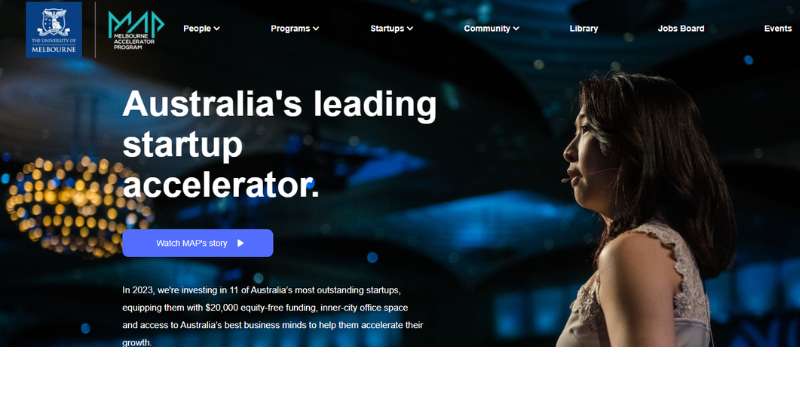
The Melbourne Accelerator Program is supported by the University of Melbourne. It has been around since 2012, also known under its short name MAP.
It offers a part-time velocity program for deep tech startups and tech entrepreneurs. It is organized around a velocity program, and you can also join full-time for 5 months of intensive training. Student entrepreneurs are also welcome to apply.
There are two ways to join the Melbourne Accelerator program. One is through the University of Melbourne; the other is by proving the social impact to prospective corporate partners.
This is what you will get:
- Events and workshops
- Co-working space
- Masterclasses and practical business-building assignments
For tech entrepreneurs who seek funding, there will be $20,000 equity-free seed funding. No wonder MAP has been a pronounced best business accelerator for years in a row, even on a global level.
Last but not least, the business accelerator recently announced its YBF partnership. This means that they can support even more innovative startups.
Springboard
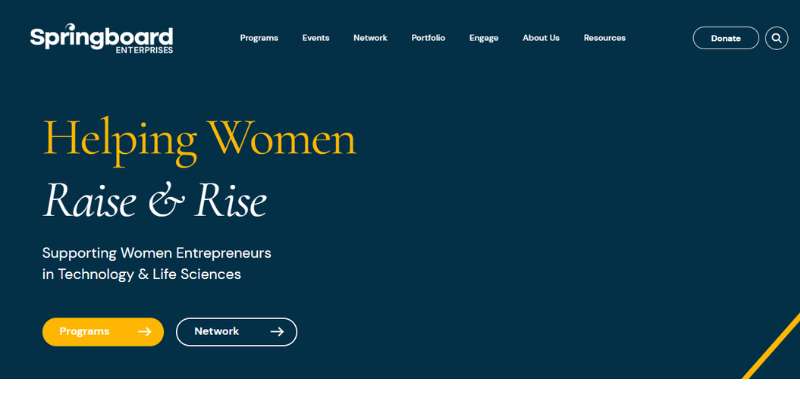
Springboard is one of the oldest startup accelerators in Australia. Kay Koplovitz and Amy Millman founded it in 1999. Their idea at the time was to tackle challenges faced by female entrepreneurs in the founder pipeline.
They organize the well-known Sydney Bootcamp. This is a 3-day program of networking events followed by a structured training course.
The future minds accelerator will then select the most ambitious entrepreneurs. They get enrolled in an 8-week coaching program and all of them get access to prominent mentors and investors. Note that the program is no longer offered exclusively to female entrepreneurs. If you are at the idea stage and want to meet industry experts, you are welcome to apply.
The impact Springboard had on the female-founder ecosystem in Australia is unparalleled. They’ve supported the business model of over 819 women-led businesses and generated $27.2 billion in value. You can also contact them if you need recommendations on startup incubators.
Also, they are not what we’d call a typical accelerator program for business development. They are, in fact, a non-profit community that wants to help and make the world a better place.
CyRise
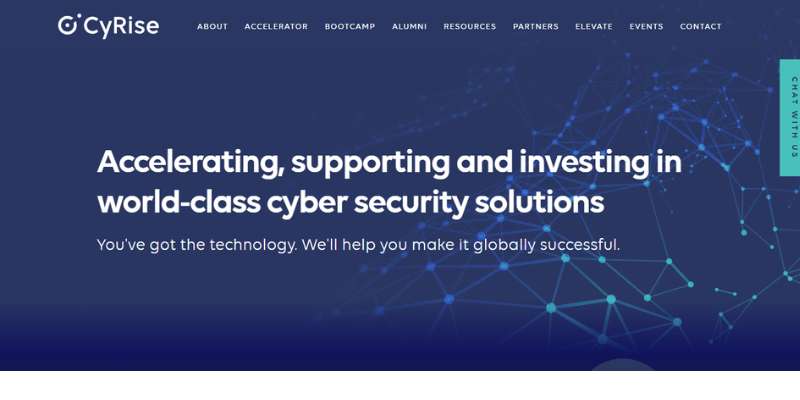
This business accelerator looks into cyber security business ideas. It was founded in Melbourne in 2017 and covers a wide range of industries. Next to cyber security, they support cloud security, network security, fraud detection, privacy, and more.
They offer the following acceleration programs:
- Six months of intensive training
- $50,000 of seed funding
- Connections to expert researchers of Deakin University, as well as industry experts as mentors
- Trips to the USA and Israel for participants to improve their understanding of global cyber security issues.
The Good Incubator
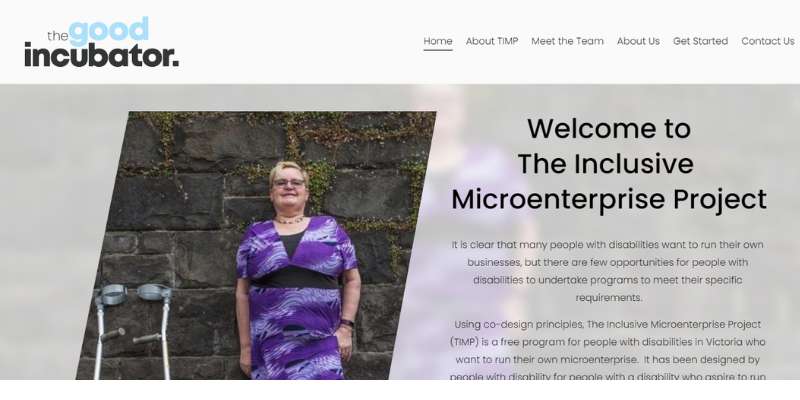
Tricia Malowney OAM, Impact Co, and Outlook Australia are the best-known founders of this startup accelerator. Their mission is to help disabled people in Victoria to grow their businesses with tailored support. As expected, they look into early-stage ideas in health, disability, and well-being.
The accelerator program will help improve your business model over only 9 weeks. You will learn about business development, trade, and scalability. The founder institute is located in Melbourne. Nevertheless, the accelerator program has representatives from all over Australia.
Cicada Innovations
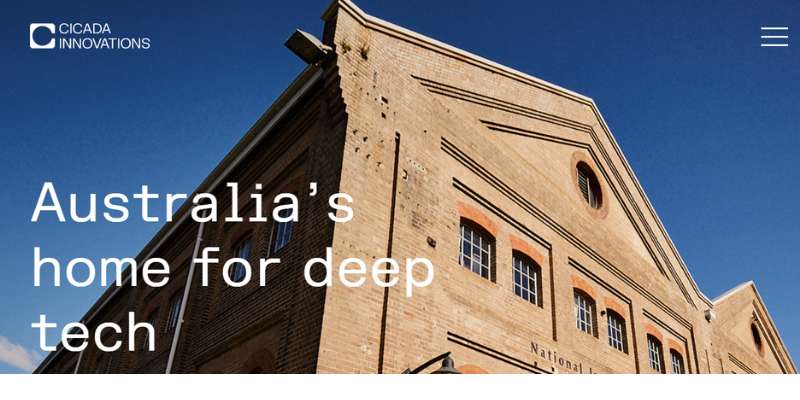
Our list of top startup accelerators would not be complete without Cicada Innovations (or ATP Innovations). Cicada Innovations is the most advanced and best-known startup accelerator for tech companies. In 2000, four of Australia’s leading universities joined forces to support early-stage innovators.
These are:
- Australian National University
- The University of New South Wales
- The University of Sydney
- and the University of Technology Sydney.
The Cicada Innovations accelerator program offers plenty of benefits. These include office space, labs for prototyping, and expert support.
Support is offered via 2 programs: Growlab and Medlab. The programs focus either on agriculture technology or healthcare solutions.
In the past two decades, Cicada Innovations helped gather over $1.6 in early stage funding. They’ve played the main role in developing hundreds of useful patents around the world.
The Impact Accelerator
Here comes another Sydney-based startup accelerator. They offer 9-month accelerator programs for all types of early-stage businesses.
They will support your business model with:
- Great coworking space and access to Hoist
- A variety of workshops with experts and entrepreneurs
- A Mirvac mentor who joins in individual sessions
- INCO’s membership for you to collaborate with over 2,000 startups around the world
- Access to $200,000 in seed capital
The Impact Accelerator supports both technical and non-technical entrepreneurs. They look for sustainable and innovative ideas that can solve urban real estate problems. They also belong to INCO, which is the leading organization in the world for environmental and social impact.
These, of course, are not all startup accelerators and incubators in Australia. If you are still looking for a suitable solution, check also:
- Skalata
- Innovyz
- H2 Ventures
- LaunchVic
- Atto Accelerator
- Crypto SA
- LVT Capital
- EnergyLab
- SlingShot Accelerator
Why should you join a startup incubator or accelerator program?
Startup accelerators and incubators in Australia have proved effective many times. They can be helpful to any early-stage business, be that a growth engine or an HR tech business idea. Accelerator programs offer all sorts of perks and advantages, even for experienced entrepreneurs.
Here are a few examples
Contacts & Networking events
Networking is the best way for entrepreneurs to exchange information and learn from each other. During networking events, they get in touch with leaders in their industry. Among those will be also skilled professionals and investors. Networking also ensures access to accomplished and vibrant alumni who could join your team. Last but not least, with networking you can generate leads and potential clients. In short, it assists your customer acquisition efforts. The better the network you’ve joined, the more credible your business will be, and the more venture capital you can raise.
With an impact accelerator or an incubator, early-stage businesses build peer connections. They also get support in and out of the accelerator program. Networking matters at any stage of your business development.
Venture capital and funding
The main reason for any early-stage business to join startup accelerators is venture capital. Newly established names in the industry have a difficult time raising funds, and this can be their main obstacle to success. Luckily, startup accelerators are there to help.
A startup incubator can also help raise funds. They work with partners and investors who offer money, as well as other meaningful resources, like co-working space. You may be offered initial capital in exchange for an equity share, so try your luck!
Mentorship
Young and ambitious entrepreneurs are eager to learn. This is why so many startup accelerators offer membership programs. Even if the startup accelerator doesn’t offer a mentor, per se, you will be exposed to industry experts who can help you. With their guidance, the new-age company can grow and develop. Your mentor will advise you on your market strategy, product development, asset management, and more.
A startup accelerator gives you a unique opportunity to learn from established industry leaders. For many new businesses, this is the biggest benefit. The more involved you are, the more successful your business will be, and you still get to keep 100% ownership.
Strict training routine
Most startup accelerators offer rigorous training programs. The duration differs, but the expectations are big. Courses are intense and very specific and cover a wide array of topics. Examples include marketing, accounting, business compliance, and more.
Co-working space
There are also startup accelerators and incubators that give you access to a co-working space. Depending on what you need, you may share the space with other teams, or even get a private office. Such facilities will also offer office supplies. You won’t have to worry about printers, photocopiers, or stable internet access.
Equipment
If you are operating in an industry where you need specialized equipment, look for a startup accelerator that can provide it. This is especially important for expensive and rare equipment and tools.
Startup accelerators that provide such equipment will also provide special training and supplies.
FAQ On Australian Incubators
What even are Australian incubators?
They’re like launchpads for startups. A cool mix of mentorship, resources, and networks.
Picture a co-working space meets university, with pros throwing in their two cents to help you make your first million—or at least avoid the startup graveyard.
How do they actually help new businesses?
It’s all about growth hacking. They provide access to business seed funding, introduce you to angel investors, and wrap you in a tight-knit community.
Plus, the workshops and training sessions? They’re golden for anyone looking to outsmart the competition.
Are there incubators for tech startups specifically?
Absolutely, and they’re buzzing hives of activity. They’ve got everything from coding workshops to demo days where you flaunt your tech to potential investors.
They’re the bridges connecting your tech brainchild with the market.
Costs involved. What’s the hit to the wallet?
Varies big time. Some might skim equity in exchange for their services, while others charge a fee.
Then you’ve got those funded by university partnerships or government programs like AusIndustry, which might be easier on the purse strings.
Success Rate. Do they even work?
Well, let’s just say your odds are better with them than without. They’re the proof of concept whisperers.
With the right work ethic, these hubs can skyrocket your chances of becoming the next big thing on the ASX.
What kinds of startups get into these programs?
Tech geniuses, eco-warriors, social change makers—you name it. If your idea’s got legs and the potential to sprint, then you’re in the running.
These places dig innovation and scalability.
What’s the duration of a typical incubator program?
Think of it as a semester. Most run for a few months, some up to a year. It’s like boot camp for your business—intense but heck, you’ll come out leaner, meaner.
Can I find an incubator that focuses on international growth?
For sure, mate. Austrade’s there for the global-minded entrepreneur. Programs are packed with market entry strategies and network expansions that think way beyond Aussie borders.
What makes Australian incubators different?
It’s the Aussie spirit—relentless, inventive, and a tad cheeky. Add the unique market dynamics down under, and you’ve got a place that’s cultivated unicorns in the most rugged of business terrains.
How do I choose the right one for my startup?
Align your startup’s heart with the incubator’s soul. Consider the niche, the mentors, past success stories, and if you can stomach the terms.
It’s part matchmaking, part strategy—a dance with due diligence if you will.
Conclusion
Navigating the vibrant world of Australian incubators isn’t just smart; it’s a strategic move straight out of the business-savvy handbook. These havens of innovation are where boundless potential meets the nitty-gritty of making it big.
- You’ve seen how they extend beyond mere office spaces, providing the entrepreneurship training and mentorship that light up the path to success.
- You’ve learned about the startup ecosystem that envelopes you in a supportive embrace, offering resources like seed funding and venture capital insights.
- And let’s not overlook the local and global networks, the angel investors ready to believe in the next best thing—your idea.
So, when the question pops up about whether to dive into the incubator scene, remember it’s about lighting that match under your ambition. Choose the right fit and you’ll have more than a fighting chance to watch your business soar. Expand your horizons, because that’s exactly what Australian incubators are here for—to turn your entrepreneurial dreams into Australia’s next success story.
If you liked this article about Australian incubators, you should check out this article about finding startup companies.
There are also similar articles discussing finding a cofounder for your startup, how to bootstrap a startup, financial plan for your startup business, and remote startup jobs.
And let’s not forget about articles on questions to ask a startup before investing, landing pages for startups, starting a business but having no ideas, and UK startup accelerators.

